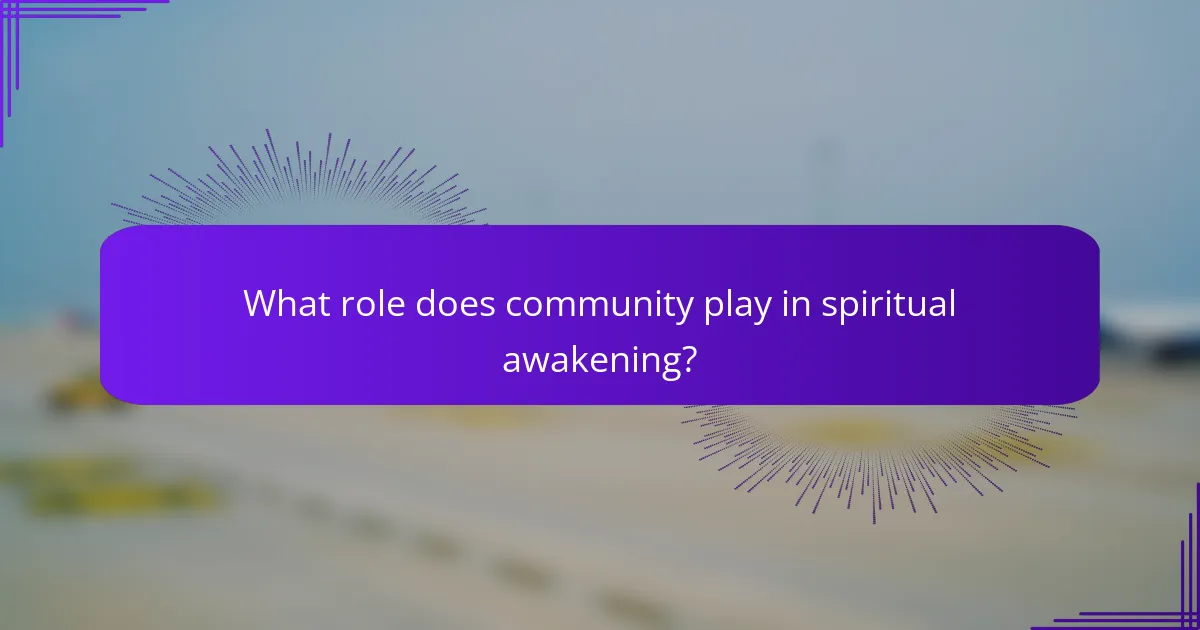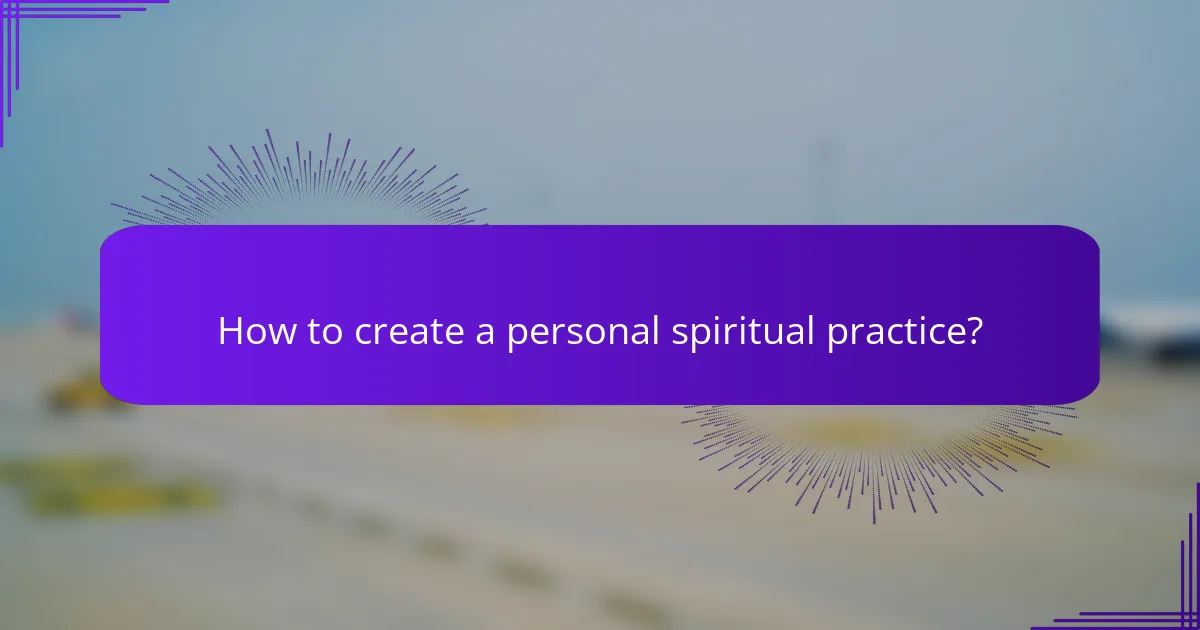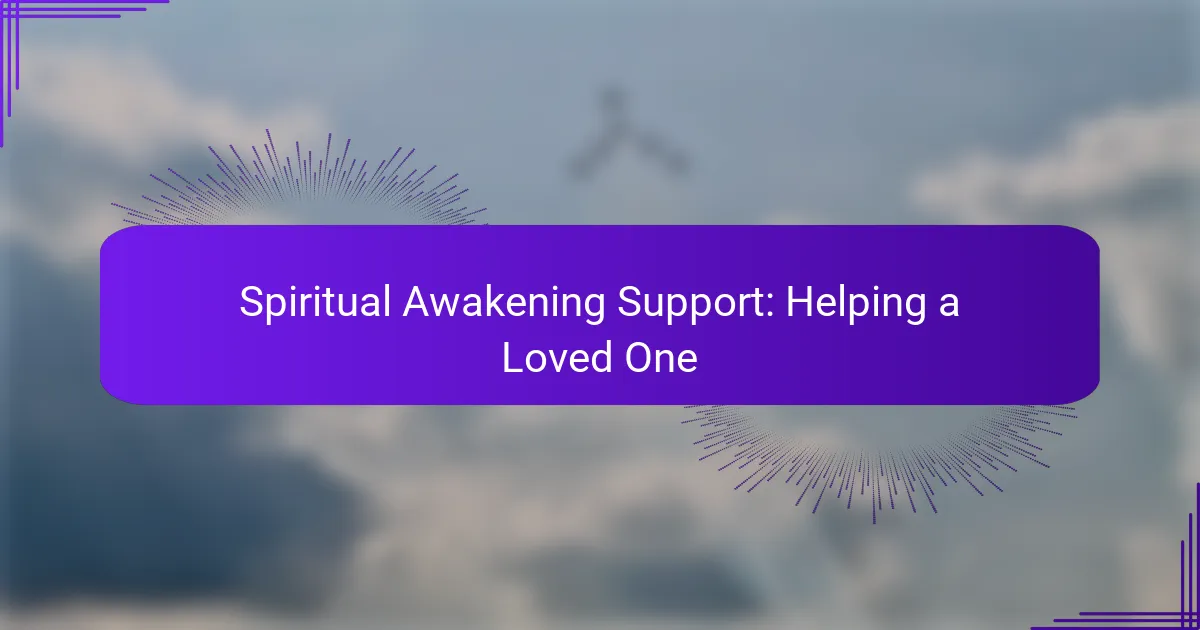Spiritual awakening can lead to profound emotional turmoil, characterized by intense feelings such as anxiety and confusion. Navigating this challenging journey requires effective techniques like mindfulness, journaling, and meditation, which foster self-awareness and emotional healing. By embracing these practices, individuals can find balance and clarity amidst the chaos of their transformative experiences.

How to manage emotional turmoil during spiritual awakening?
Managing emotional turmoil during spiritual awakening involves recognizing and processing intense feelings while maintaining a sense of balance. Techniques such as mindfulness, journaling, support groups, and therapeutic approaches can help navigate this challenging period.
Mindfulness practices
Mindfulness practices focus on being present and aware of your thoughts and feelings without judgment. Techniques like meditation, deep breathing, and body scans can ground you during emotional upheaval. Aim to practice mindfulness for at least 10-20 minutes daily to cultivate a sense of calm.
Consider incorporating mindful walking or yoga, which can help connect your body and mind. These practices not only reduce stress but also enhance emotional resilience during spiritual transitions.
Journaling techniques
Journaling can serve as a powerful tool for processing emotions during spiritual awakening. Writing about your feelings, experiences, and insights allows for reflection and clarity. Set aside time each day to jot down your thoughts, focusing on both challenges and breakthroughs.
Try using prompts such as “What am I feeling right now?” or “What insights have I gained this week?” This structured approach can help you track your emotional journey and recognize patterns over time.
Support groups
Joining a support group can provide a sense of community and shared understanding during emotional turmoil. These groups often consist of individuals experiencing similar spiritual awakenings, allowing for open discussions about feelings and experiences. Look for local or online groups that meet regularly to foster connection.
Engaging with others can alleviate feelings of isolation and provide valuable insights. Many find comfort in hearing how others navigate their emotional challenges, which can inspire personal growth and healing.
Therapeutic approaches
Therapeutic approaches, such as counseling or coaching, can be beneficial for managing emotional turmoil. A trained professional can help you explore underlying issues and develop coping strategies tailored to your needs. Consider seeking therapy that specializes in spiritual or existential concerns.
Additionally, techniques such as cognitive-behavioral therapy (CBT) can help reframe negative thought patterns, while somatic therapies focus on the body’s role in emotional processing. Finding the right therapeutic fit is crucial for effective support during this transformative time.

What are the common emotional challenges faced?
Individuals undergoing spiritual awakening often encounter a variety of emotional challenges. These can include heightened anxiety, feelings of depression, and a sense of confusion about their new experiences and insights.
Anxiety and fear
Anxiety and fear are prevalent emotional challenges during spiritual awakening. As individuals confront new beliefs and experiences, they may feel overwhelmed by uncertainty about their path or the implications of their insights.
To manage anxiety, consider grounding techniques such as deep breathing, mindfulness meditation, or journaling. These practices can help center your thoughts and reduce feelings of panic.
Avoid isolating yourself; instead, seek support from trusted friends or spiritual communities. Sharing your experiences can alleviate fear and provide reassurance.
Depression and sadness
Depression and sadness can arise as individuals reflect on their past and confront unresolved issues during their spiritual journey. This emotional turmoil may stem from a sense of loss or disconnection from former identities.
Engaging in self-care activities, such as exercise, creative expression, or spending time in nature, can help uplift your mood. Establishing a routine that includes these activities can provide structure and stability.
If feelings of sadness persist, consider reaching out to a mental health professional who understands spiritual issues. They can offer guidance tailored to your unique experience.
Confusion and uncertainty
Confusion and uncertainty are common as individuals navigate the complexities of spiritual awakening. New insights may challenge previously held beliefs, leading to a sense of disorientation.
To cope with confusion, take time to reflect on your experiences. Keeping a journal can help clarify your thoughts and feelings, allowing you to process your journey more effectively.
Engage with educational resources, such as books or workshops, that resonate with your spiritual interests. This can provide context and help you make sense of your evolving understanding.

How can meditation aid in emotional healing?
Meditation can significantly support emotional healing by promoting mindfulness and self-awareness, allowing individuals to process their feelings more effectively. By creating a calm mental space, meditation helps reduce stress and anxiety, facilitating a deeper understanding of one’s emotional landscape.
Types of meditation
There are several types of meditation, each with unique approaches to emotional healing. Mindfulness meditation focuses on being present in the moment, while loving-kindness meditation encourages compassion towards oneself and others. Other forms include guided meditation, where a facilitator leads the session, and transcendental meditation, which uses specific mantras to help achieve a deep state of relaxation.
Choosing the right type of meditation depends on personal preferences and emotional needs. Beginners may find mindfulness or guided meditation more accessible, while those seeking deeper experiences might explore transcendental techniques.
Benefits of meditation
Meditation offers numerous benefits for emotional healing, including reduced symptoms of anxiety and depression. Regular practice can enhance emotional regulation, leading to improved resilience in the face of stress. Additionally, meditation fosters a greater sense of self-acceptance, which is crucial for healing emotional wounds.
To maximize the benefits, aim for consistent practice, starting with just a few minutes daily and gradually increasing the duration. Many find that even short sessions can lead to noticeable improvements in mood and emotional clarity.

What role does community play in spiritual awakening?
Community plays a crucial role in spiritual awakening by providing support, shared experiences, and a sense of belonging. Engaging with others on similar paths can help individuals navigate emotional turmoil and deepen their understanding of their spiritual journey.
Finding local spiritual communities
To find local spiritual communities, start by exploring nearby meditation centers, yoga studios, or spiritual bookstores that often host events. Many cities have groups dedicated to specific practices, such as Buddhism, New Age spirituality, or indigenous traditions.
Consider attending workshops or meetups to connect with like-minded individuals. Local bulletin boards, community centers, and social media platforms can also be valuable resources for discovering gatherings and events in your area.
Online support networks
Online support networks have become increasingly popular for those seeking spiritual connection. Websites and forums dedicated to spirituality allow individuals to share experiences, ask questions, and receive guidance from others around the world.
Platforms like Facebook, Reddit, and specialized spiritual forums offer groups where members can discuss their journeys, share resources, and provide emotional support. When joining these networks, look for groups that align with your specific interests and values to ensure a positive experience.

What are the signs of a spiritual awakening?
Signs of a spiritual awakening often include profound shifts in perception, emotional upheaval, and changes in personal relationships. Individuals may experience heightened awareness, increased sensitivity to their surroundings, and a desire for deeper connections.
Heightened awareness
Heightened awareness during a spiritual awakening manifests as a deeper understanding of oneself and the world. This can include a stronger intuition, an ability to sense energies, and a greater appreciation for the present moment. People may find themselves more attuned to their thoughts and feelings, leading to significant personal insights.
To navigate this heightened awareness, practice mindfulness techniques such as meditation or journaling. These methods can help ground your experiences and clarify your thoughts. Be cautious, as overwhelming sensations may arise; take breaks when needed to avoid emotional fatigue.
Changes in relationships
Changes in relationships are common during a spiritual awakening, as individuals often reassess their connections with others. You may find that certain relationships become more meaningful, while others may fade away due to differing values or perspectives. This shift can lead to both positive and challenging dynamics.
To manage these changes, communicate openly with loved ones about your experiences and feelings. Establish boundaries if necessary, and seek support from those who share similar spiritual journeys. Remember, it’s natural for relationships to evolve, so embrace the process and allow yourself to grow alongside it.

How to create a personal spiritual practice?
Creating a personal spiritual practice involves establishing routines and activities that resonate with your beliefs and values. This practice can help you navigate emotional turmoil by fostering mindfulness, connection, and inner peace.
Daily rituals
Daily rituals are essential for grounding your spiritual practice. These can include meditation, journaling, or setting intentions each morning. Aim for consistency, dedicating at least 10-20 minutes daily to these activities.
Consider incorporating practices such as gratitude lists or affirmations to enhance your emotional well-being. Avoid overwhelming yourself; start small and gradually expand your rituals as you become more comfortable.
Incorporating nature
Connecting with nature can significantly enrich your spiritual practice. Spend time outdoors, whether it’s a walk in the park or gardening, to foster a sense of peace and connection to the earth. Aim for at least a few minutes each day to immerse yourself in natural surroundings.
Engage your senses by observing the sights, sounds, and smells of nature. This can help you cultivate mindfulness and reduce stress. Remember to be present; leave distractions behind to fully experience the moment.

What are the long-term effects of spiritual awakening?
The long-term effects of spiritual awakening can lead to profound changes in an individual’s emotional and psychological landscape. Many experience heightened self-awareness, shifts in values, and a deeper connection to others and the universe.
Personal growth
Spiritual awakening often catalyzes significant personal growth, encouraging individuals to confront their fears and limiting beliefs. This process can lead to enhanced resilience, improved decision-making, and a clearer sense of purpose.
To foster personal growth, consider setting aside regular time for self-reflection, journaling, or meditation. Engaging in these practices can help you identify areas for improvement and track your progress over time.
Increased empathy
One of the notable effects of spiritual awakening is an increase in empathy towards others. This heightened sensitivity allows individuals to better understand and share the feelings of those around them, fostering deeper connections.
To cultivate empathy, practice active listening and try to view situations from others’ perspectives. Volunteering or engaging in community service can also enhance your understanding of diverse experiences and challenges faced by others.



